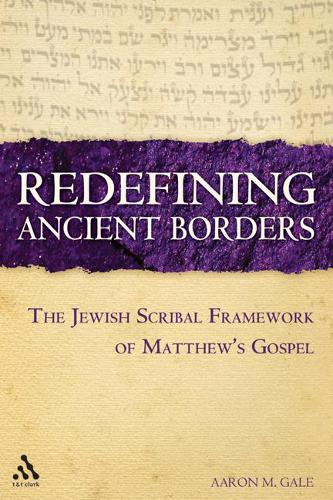
Redefining Ancient Borders: The Jewish Scribal Framework of Matthew's Gospel
(Paperback)
Publishing Details
Redefining Ancient Borders: The Jewish Scribal Framework of Matthew's Gospel
By (Author) Aaron M. Gale
Bloomsbury Publishing PLC
T.& T.Clark Ltd
1st October 2005
United Kingdom
Classifications
Tertiary Education
Non Fiction
226.206
Physical Properties
Paperback
208
318g
Description
Matthew's community, contrary to what many scholars believe, was a cosmopolitan, wealthy Jewish Christian community located in Galilee. Gale concludes that Matthew's community was a conservative Christian community located in Galilee that still believed the laws of the Torah were valid and required strict adherence. Gale's argument contrasts with many scholars who argue that the Matthean church was in the process of, or had already abolished, the Torah. Gale uses material evidence to indicate that Matthew's community was cosmopolitan and wealthy, and he argues that the community was also highly learned, comprised of many scribes. Gale concludes that the Matthean church was located near Sepphoris and was a wealthy, urban, and learned community.
Reviews
"Gale... offers some unique perspectives on Matthew's gospel.... Gale's study brings some creative points to the on going discussion."- The Bible Today, April/May 2006
Review by Fred W. Burnett, Anderson University, Religious Stduies review
"Redefining Ancient Borders sculpts a renewed vision of the origins of the gospel, the economic level of the community, and their literacy. But above all he argues that Matthew's community is a learned community. I could not read it through in one sitting, but I tried. He understands how to use archaeological evidence better than a host of others who have claimed such knowledge." --James F. Strange, Departments of Relgious Studies, University of South Florida -- James F. Strange * Blurb from reviewer *
"Aaron Gale has added a new dimension to Matthean scholarship by proposing that the audience for the authors of Matthew's gospel was wealthy, aristocratic, and learned in Jewish texts. Edited and 'published' ca. 85 CE, Gale locates its Jewish Christian authors in Sepphoris, capital of Galilee in the time of Jesus. Whatever one's position on any of these key points might be, this attractive and accessible volume is sure to stimulate fruitful and important new discussions on the state of Jewish and Jewish Christian interaction in Palestine after 70 CE and on such important related topics as literacy and the original language of Matthew and his audience. Historians and New Testament scholars alike will benefit greatly from this innovative work." -Eric M. Meyers, Bernice and Morton Lerner Professor of Judaic Studies and Director of the Graduate Program in Religion, Duke University * Blurb from reviewer *
"Aaron Gale has written a clear and informative book that will enrich current discussions about Matthew's meaning in context. Matthew's Gospel, incorporating sophisticated exegetical techniques, was the product of Torah-loyal scribes under the sponsorship of a wealthy Jewish Christian group in Sepphoris. Gale's careful depiction is especially valuable for its wide-ranging engagement with contemporary scholarship on Matthew and the social world of Roman Galilee." Douglas E. Oakman, Ph.D. Dean of Humanities and Associate Professor of Religion Pacific Lutheran University * Blurb from reviewer *
In this revision of his doctoral thesis, Aaron M. Gale uses literary, social, political, and economic data to argue for a redefinition of both the provenance of the Gospel according to Matthew and the borders between formative Judaism and the first-century Jesus movement, especially the strand that gave rise to this most Jewish of gospels. Previous scholars such as Vermes, Neusner, Meier, and Saldarini have been chipping away at the notion of a monolithic Judaism in opposition to an idealized, universal Christianity of the first century CE. G's argument contributes what one hopes may be the last nail in the coffin of this anachronistic and overly-simplistic view of Christian history. His argument for a Galilean provenance of GMattwith Sepphoris as a key contenderis allusive and wide-ranging, drawing from the most recent archaeological, economic, and social-historical studies. That case alone would make the book worthy of attention. The careful argument for the scribal nature of GMatt, based on detailed comparisons with Mishnaic texts and forms of argumentation, makes this volume even more valuable. G's analysis of the ruling on divorce in Matt 5:31-32 (cf. 19:9) as an example of the binyan av is a particularly strong case for understanding GMatt as a product of an educated, Jewish scribal culture. Whether considering the geographical or religio-cultural provenance, Redefining Ancient Borders contributes important insights to the contemporary discussion of GMatt. G's work is a worthwhile read for academic and lay audiences alike. --Shelia McGinn, Professor of Biblical Studies and Early Christianity, John Caroll University -- Sheila McGinn * Blurb from reviewer *
Author Bio
Aaron M. Gale is an Assistant Professor of religious studies as well as the Coordinator of the Program for Religious Studies at West Virginia University. He is the co-compiler (with Sheila E. McGinn) of Bibliographies for Biblical Research: The Book of Revelation.
